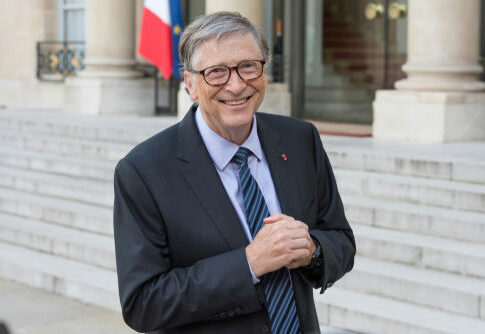Millions of dollars flowing from America’s most influential charitable foundations to Chinese Communist Party-connected entities has triggered a Senate probe—raising questions about how far philanthropy can go before it crosses the line of U.S. tax law.
Senate Demands Answers on Charitable Foundations’ China Ties
Senate Judiciary Committee Chairman Chuck Grassley recently launched investigations into the Bill and Melinda Gates Foundation, the Rockefeller Brothers Fund, and the Ford Foundation, citing concerns that these organizations may be violating tax law by donating millions to groups tied to the Chinese Communist Party. Grassley’s letters, sent in late October, demand clarity and accountability: Are these foundations directly or indirectly supporting the interests of a foreign government, and do such actions fit within the bounds of their charitable missions and federal law?
Imagine being a kid hearing every day in school: the world’s ending, no clean air, climate destroyed—pure paranoia from Bill Gates’ climate scam.
Now, the Senate is probing the Gates Foundation and its relationship with the CCP, and Gates is backtracking. pic.twitter.com/BZyY6zdoqW
— Mel Carmine (@geseraneseraqfs) November 3, 2025
The backdrop to Grassley’s inquiry is a series of reports detailing how these venerable institutions have channeled substantial sums—often in the millions—toward Chinese government entities, CCP-led organizations, and military-linked companies. The Washington Examiner’s review of foundation tax forms revealed that the Rockefeller Brothers Fund, for instance, donated $7.4 million between April 2020 and August 2024 to organizations either embedded within the Chinese government, led by CCP members, or actively partnering with Beijing. Meanwhile, the Gates Foundation reportedly sent $11.7 million to “various CCP arms,” $2 million to a Chinese rail company identified by the Defense Department as part of China’s military apparatus, and an additional $6.7 million to Chinese state-run universities in 2023 alone.
The Ford Foundation is no less prominent in these revelations, with nearly $10 million in grants going to Chinese government arms for the Belt and Road Initiative—a mammoth infrastructure program widely seen as a vehicle for expanding China’s global influence. These figures, drawn directly from foundation disclosures, have sparked a national conversation about the limits and responsibilities of American philanthropy, especially when recipients may advance the interests of a geopolitical rival.
Tax Law and the Limits of Philanthropy
Federal law governing charitable organizations is explicit: to retain 501(c)(3) tax-exempt status, an organization’s activities must be charitable and may not “directly support or promote the interests of a foreign government.” Grassley’s letters put this legal requirement front and center, suggesting that the foundations’ reported support for CCP-linked entities could run afoul of IRS rules. The stakes are high—not only for the foundations themselves, whose credibility and tax status are on the line, but for the wider philanthropic sector, which relies on public trust and government favor to operate.
Oh boy… into the heart of darkness we go 👀
BREAKING: The Bill and Melinda Gates Foundation is now being Investigated for Funneling MILLIONS into Chinese PLA Fronts, violating IRS Rules funding foreign Governments
Senate Judiciaryhttps://t.co/uIj435hpZd pic.twitter.com/RqQuE1POBA
— MJTruthUltra (@MJTruthUltra) October 28, 2025
If charitable dollars are being funneled to organizations that serve foreign state interests, especially those of a strategic competitor, Americans might rightly ask whether such grants genuinely serve charitable purposes or inadvertently bolster adversarial regimes. The investigation’s outcome could reshape the way U.S. charities approach global giving, particularly when the recipient country is embroiled in tensions with Washington.
Foundations Respond: Defending Charitable Intentions
The foundations, for their part, have responded with carefully crafted statements emphasizing their commitment to legal compliance and the public good. A Gates Foundation spokesperson affirmed the foundation’s adherence to all laws and its mission to improve health and productivity for all people. The Ford Foundation insisted its grants in China aim to reduce poverty, promote international cooperation, and advance democratic values—“fundamental American priorities.” Both organizations stressed robust controls and oversight to ensure funds are used solely for their intended charitable objectives.
The Rockefeller Brothers Fund did not immediately respond to requests for comment, leaving an open question about its perspective and internal safeguards. Despite these assurances, Grassley’s probe underscores a larger debate about whether intentions alone are enough—and whether existing oversight mechanisms can truly guarantee compliance in a world where global partnerships often blur the lines between charity, influence, and national interest.
Gates. Poisoning America. https://t.co/qUwi33Zr02
— 2024 John Flynn US Senate Candidate For CT (@Flynn2022) November 2, 2025
The Future of Oversight and Global Philanthropy
This unfolding investigation signals a new era for American philanthropy, where transparency, accountability, and alignment with national interests are under more scrutiny than ever before. Lawmakers and the public may soon demand not only that charitable giving be “charitable” in nature, but also that it avoids entanglements with foreign governments whose interests may diverge sharply from those of the United States. The open question remains: Will stricter oversight or new rules emerge, reshaping how foundations navigate the complex global landscape?
As the Senate inquiry deepens, the answers—and their implications—will reverberate throughout the world of charitable giving, potentially setting new boundaries for what it means to serve the public interest in an age of geopolitical rivalry.
Sources:
Senate Judiciary Committee Press Release


I say, Keep Digging, Senator Grassley!! All those millions could have served our own needs right here, at home, in America, and not communist China!